Parent volunteers are vital to the success of marching bands, offering essential support and resources that enhance the experience for both students and the program. Their involvement fosters a strong sense of community, ensuring smooth operations and allowing students to thrive both socially and musically.
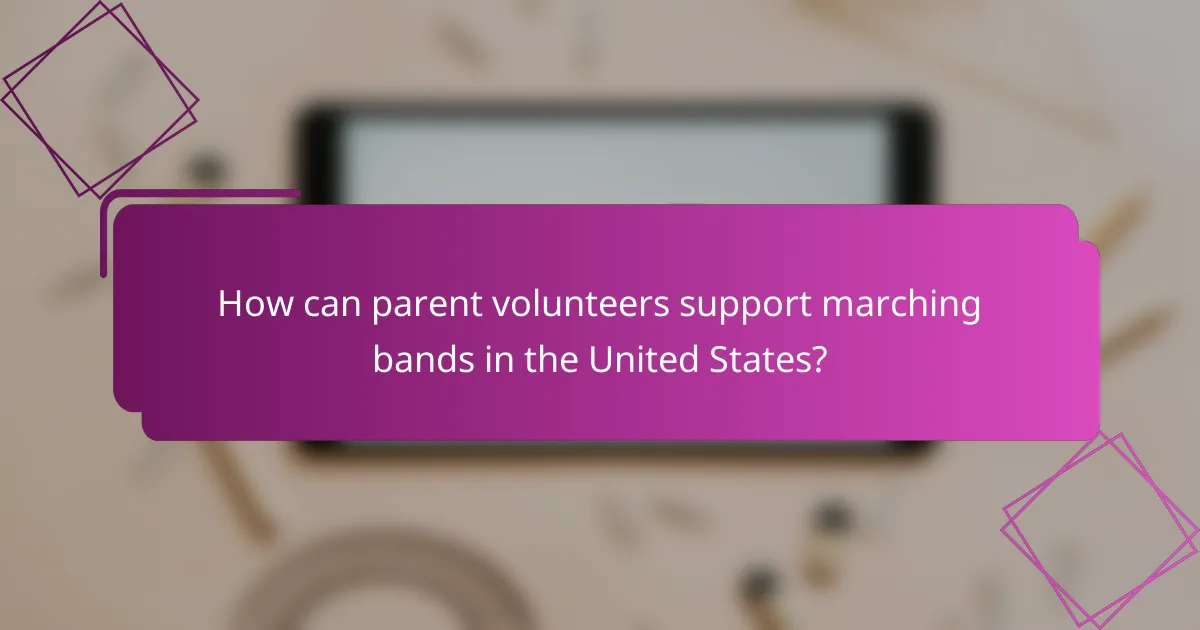
How can parent volunteers support marching bands in the United States?
Parent volunteers play a crucial role in supporting marching bands by providing essential resources and assistance. Their involvement can enhance the overall experience for students and help ensure the smooth operation of band activities.
Organizing fundraising events
Fundraising events are vital for marching bands to cover costs such as travel, uniforms, and equipment. Parents can organize activities like car washes, bake sales, or community concerts to raise money. Setting clear goals and timelines for these events can help maximize participation and contributions.
Consider collaborating with local businesses for sponsorships or donations. This not only boosts fundraising efforts but also strengthens community ties and increases visibility for the band.
Providing transportation for students
Transportation is essential for marching bands, especially during competitions and performances. Parent volunteers can coordinate carpooling or provide rides to ensure all students arrive safely and on time. Establishing a transportation schedule can help streamline this process.
It’s important to communicate clearly with parents about transportation needs and any specific regulations, such as background checks for drivers, to ensure student safety during travel.
Assisting with uniforms and equipment
Uniforms and equipment are significant aspects of a marching band’s identity and performance. Parents can assist by helping with fittings, alterations, and maintenance of uniforms. Regular checks and cleaning can prolong the life of these items and ensure they look their best during performances.
Additionally, parents can help inventory and manage equipment, ensuring that instruments and accessories are in good condition and ready for use. Creating a checklist for equipment maintenance can help keep everything organized and functional.
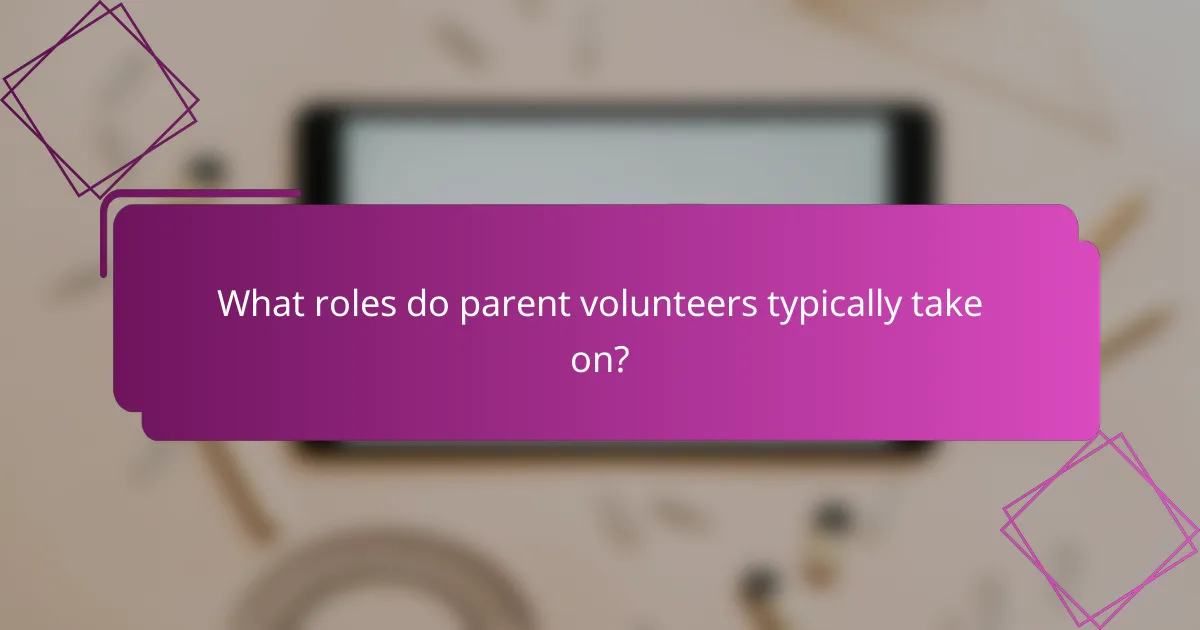
What roles do parent volunteers typically take on?
Parent volunteers in marching bands often take on essential roles that support the students and the program. Their involvement can significantly enhance the overall experience for both the performers and the organization.
Chaperones during events
Chaperones play a crucial role during events by ensuring the safety and well-being of the students. They supervise the band members during performances, competitions, and travel, providing guidance and support as needed.
Typically, chaperones are responsible for managing student behavior, ensuring they stay with the group, and addressing any immediate concerns. It’s important for chaperones to be familiar with the event schedule and communicate effectively with both students and band directors.
Fundraising coordinators
Fundraising coordinators are vital for securing the financial resources necessary for the marching band to operate. They organize events such as car washes, bake sales, and sponsorship drives to raise money for uniforms, instruments, and travel expenses.
Successful fundraising requires planning and community engagement. Coordinators should set clear goals, create a budget, and promote events through social media and local networks to maximize participation and donations.
Logistics managers
Logistics managers handle the behind-the-scenes details that keep the marching band running smoothly. Their responsibilities include arranging transportation, scheduling rehearsals, and coordinating equipment needs for performances.
Effective logistics management involves attention to detail and proactive communication with vendors, venues, and band members. Managers should create checklists and timelines to ensure that all aspects of events are covered, minimizing last-minute issues.
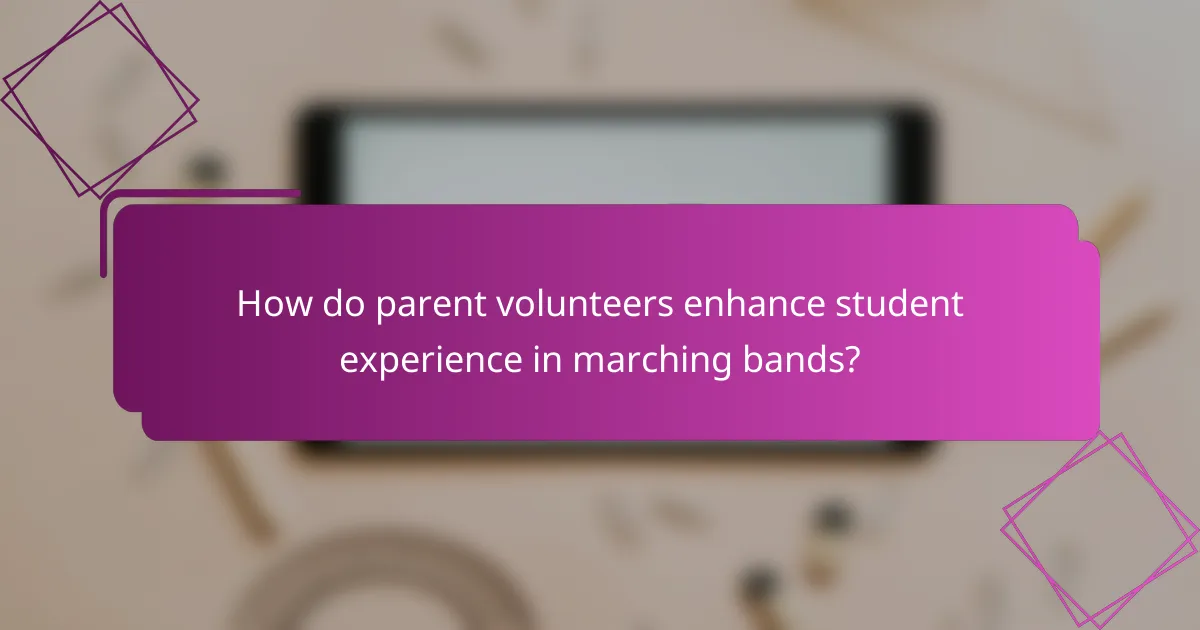
How do parent volunteers enhance student experience in marching bands?
Parent volunteers play a crucial role in enhancing the student experience in marching bands by providing support, resources, and a sense of community. Their involvement not only helps with logistical tasks but also fosters an environment where students can thrive socially and musically.
Building community and camaraderie
Parent volunteers help create a strong sense of community within marching bands by organizing events and activities that bring families together. This can include potlucks, fundraisers, and social gatherings that allow students and parents to interact outside of rehearsals.
By participating in these activities, parents contribute to a supportive atmosphere that encourages teamwork and friendships among students. This camaraderie can lead to improved morale and a more enjoyable experience for everyone involved.
Offering mentorship and guidance
Parents with musical backgrounds can offer valuable mentorship to students in marching bands. They can provide guidance on instrument techniques, music theory, and performance skills, which can enhance students’ learning experiences.
Additionally, parent volunteers can help organize workshops or clinics led by experienced musicians, offering students opportunities to learn from professionals. This mentorship not only improves musical skills but also builds confidence and fosters a love for music.
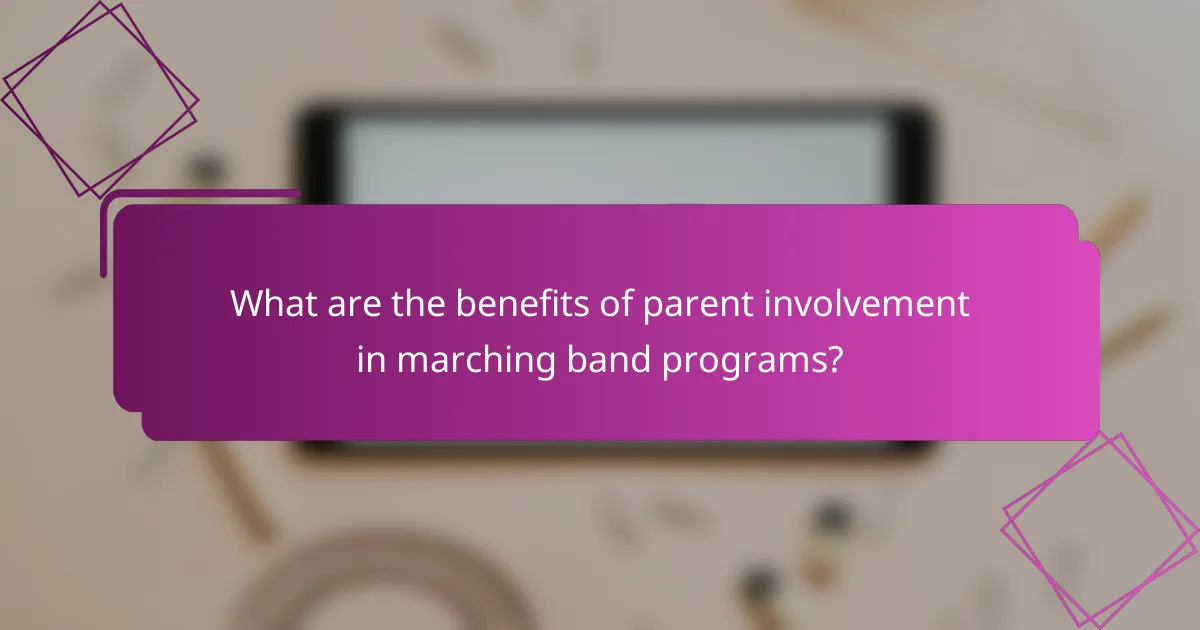
What are the benefits of parent involvement in marching band programs?
Parent involvement in marching band programs brings numerous benefits, including enhanced funding and a robust support network for students and staff. Engaged parents contribute to the overall success of the band, fostering a positive environment that encourages student participation and achievement.
Increased funding and resources
Active parent volunteers can significantly boost funding and resources for marching band programs. They often organize fundraising events, such as car washes, bake sales, and sponsorship drives, which can raise hundreds to thousands of dollars each year. These funds can be used for uniforms, instruments, travel expenses, and other essential needs.
Additionally, parents may help secure donations from local businesses or community organizations, further enhancing the program’s financial stability. Establishing a clear fundraising goal and regularly communicating progress can motivate parents to contribute more effectively.
Stronger support networks
Parent volunteers create a strong support network that benefits both students and band directors. This network fosters communication between parents and staff, ensuring everyone is informed about schedules, events, and needs. Regular meetings and social gatherings can strengthen relationships and build a sense of community.
Moreover, a supportive parent group can help manage logistics during events, such as competitions and performances. By dividing responsibilities among volunteers, the band can operate smoothly, allowing students to focus on their music and performance skills.
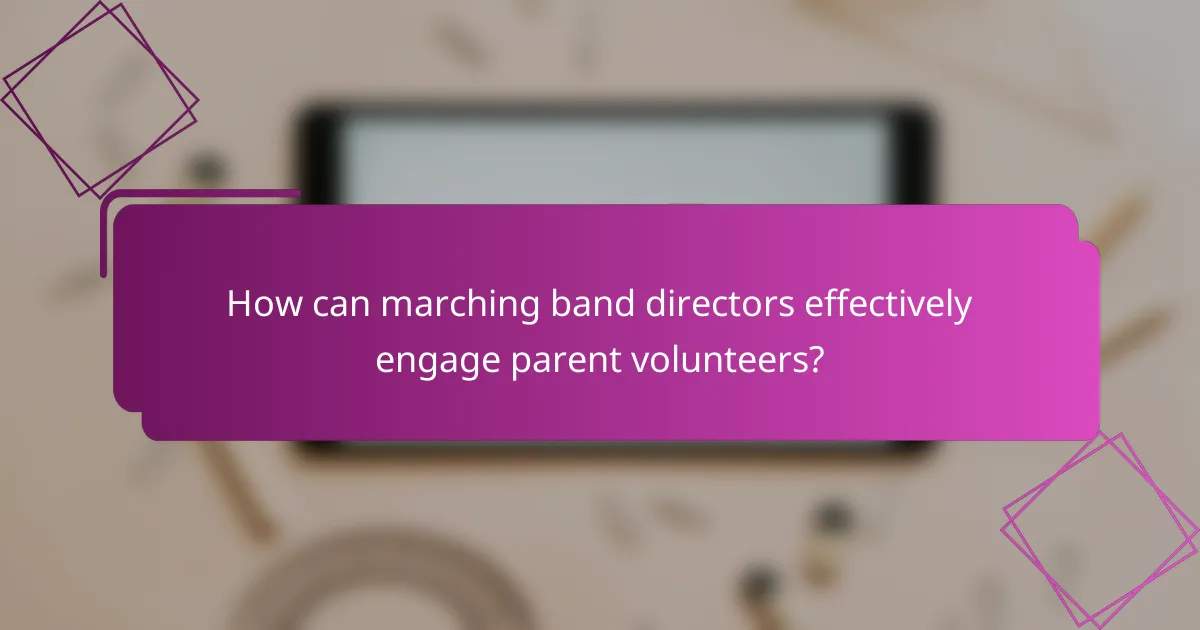
How can marching band directors effectively engage parent volunteers?
Marching band directors can effectively engage parent volunteers by fostering a collaborative environment that values communication and organization. By actively involving parents in various roles, directors can enhance the overall experience for both students and families.
Regular communication and updates
Establishing regular communication is essential for keeping parent volunteers informed and motivated. Directors should utilize multiple channels such as emails, newsletters, and social media groups to share updates about rehearsals, performances, and volunteer opportunities.
Consider setting a consistent schedule for updates, such as weekly emails or monthly meetings, to ensure parents feel connected and engaged. This approach helps to build a strong community and encourages parents to participate actively in their children’s marching band experience.
Creating volunteer committees
Forming volunteer committees can streamline tasks and enhance parental involvement in specific areas. Directors should identify key roles such as fundraising, event planning, and logistics, and invite parents to join committees that match their interests and skills.
By delegating responsibilities, directors can empower parents and create a sense of ownership within the band community. Regular committee meetings can help maintain momentum and ensure that everyone is aligned with the band’s goals and needs.
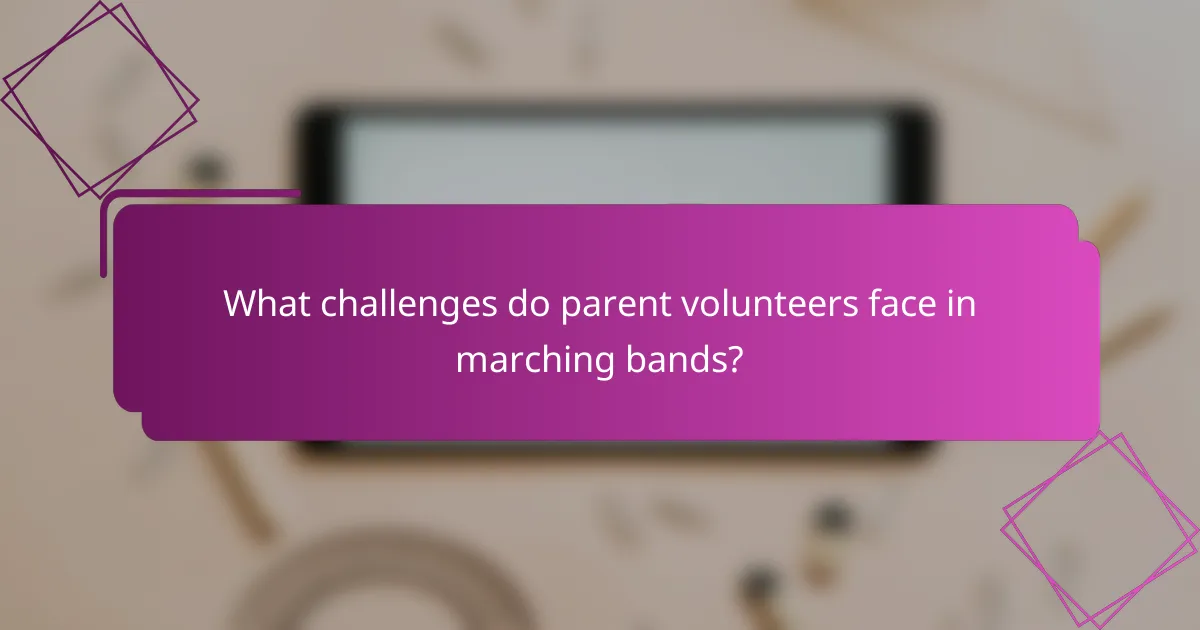
What challenges do parent volunteers face in marching bands?
Parent volunteers in marching bands often encounter challenges related to time management, balancing personal commitments, and navigating the demands of the band program. These obstacles can impact their ability to contribute effectively while maintaining their own responsibilities.
Time commitment and scheduling conflicts
One of the primary challenges for parent volunteers is the significant time commitment required for marching band activities, which often include rehearsals, competitions, and fundraisers. These events can take place during evenings and weekends, leading to potential scheduling conflicts with work or family obligations.
To manage these conflicts, parents should communicate openly with band directors about their availability and seek to coordinate schedules whenever possible. Creating a shared calendar for band events can help all volunteers stay informed and plan accordingly.
Balancing responsibilities with personal life
Balancing responsibilities as a parent volunteer with personal life can be difficult, especially when juggling work, family, and other commitments. Volunteers may find themselves stretched thin, which can lead to burnout if not managed properly.
To maintain a healthy balance, parents should prioritize their tasks and set realistic expectations for their involvement. It can be helpful to delegate responsibilities among other volunteers and to take breaks when needed, ensuring that they remain engaged without overwhelming themselves.

How can marching bands in urban areas leverage parent support?
Marching bands in urban areas can effectively leverage parent support by actively involving them in various organizational roles and initiatives. This collaboration not only enhances the band’s resources but also fosters a strong community connection.
Utilizing local businesses for sponsorship
Local businesses can provide essential financial support and resources for marching bands. By forming partnerships, bands can secure sponsorships that may cover uniforms, instruments, or travel expenses.
To engage local businesses, bands should create a sponsorship proposal outlining the benefits for the business, such as advertising opportunities at events or recognition in promotional materials. Approaching businesses that have a vested interest in community engagement often yields the best results.
Engaging with community organizations
Community organizations can play a pivotal role in supporting marching bands through funding, resources, or volunteer efforts. Collaborating with local nonprofits, schools, or cultural groups can help bands access additional support and create a network of advocates.
To effectively engage these organizations, bands should identify shared goals and propose joint initiatives, such as community performances or educational workshops. This not only strengthens ties but also enhances the visibility and impact of the marching band within the urban community.
